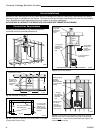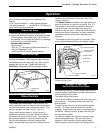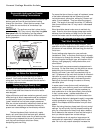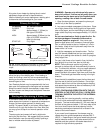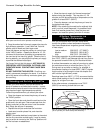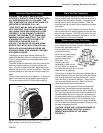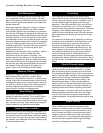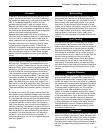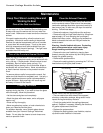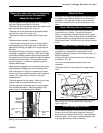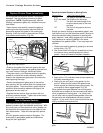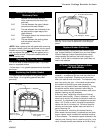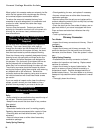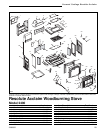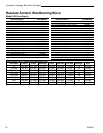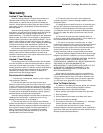
24
Vermont Castings Resolute Acclaim
2000893
Maintenance
Keep Your Stove Looking New and
Working Its Best
Care of the Cast Iron Surface
An occasional dusting with a dry rag will keep the
painted cast iron of your Resolute Acclaim looking new.
A damp cloth may be used as well, but only when the
stove is cool. Make sure no water remains on the stove
surface.
If the paint needs retouching, allow the stove to cool
completely. Wire-brush areas needing to be painted.
Remove non-painted components such as air controls
or cover them with masking tape. Touch up the stove
with high temperature stove paint available from your
local dealer. Apply the paint sparingly. Two light coats
are better than one heavy one.
Care of the Porcelain Enamel Surface
Use a dry rag or a soft brush. Do not use water or
other liquids. Fingerprints usually can be buffed off with
a dry, soft rag. If marks remain, allow the stove to cool
completely, then buff with a damp, soft rag. Dry
completely before starting a fire so that water drops or
wet streaks will not leave marks. Never use abrasives
or harsh chemical cleaners on the porcelain enamel
finish.
To remove stains or spills from porcelain enamel, first
make sure that the stove is completely cool. Use only a
kitchen appliance cleaner or polish recommended for
enamel surfaces. Apply sparingly with a soft rag and
buff away all traces of the cleaner.
Cleaning the Glass
Most of the carbon deposits on the glass will burn off
regularly during hot fires. If you wish to clean the glass
more thoroughly, follow this procedure:
• Let the stove and glass cool completely.
• Wash the glass with warm water, and a soft paper
towel or rag.
• Rinse and dry thoroughly.
• Never use abrasives, ashes, or harsh chemicals to
clean your Resolute Acclaim glass.
For stubborn deposits, use a ceramic glass cleaner
available from your Vermont Castings’ Authorized
Dealer. Do not allow the cleaner to touch brass orna-
ments or porcelain finish.
Clean the Exhaust Channels
The firebricks and sealing plates should be removed
and the exhaust area on either side of the secondary
combustion package should be vacuumed carefully at
least once a year, or after every 60 days of sustained
burning. Follow these steps:
• Remove the ashpan, the griddle and the andirons.
• Remove the left and right side firebrick by lifting them
approximately 1/2" and swinging the front edge in
toward the firebox center. Inserting a flat screwdriver
blade underneath the brick and lifting will make the
removal easier.
Warning: Handle firebrick with care. Protruding
steel reinforcement wires could cause injury.
Rough handling could break firebricks.
• Remove the two rear firebricks by leaning them
forward, removing the retainer clip and lifting them out
through the griddle opening.
• Remove both grate sections.
• Remove the sealing plates by removing the 7/16" hex
head bolts and pulling the plate forward.
Left
Sealing
Plate
Rear Firebricks
Retainer Clip
Right
Firebrick
ST617
Fig. 33 Remove left and right sealing plates.
• Vacuum debris from both sides of the exposed
refractory combustion package, being careful not to
impact the fragile refractory material.
• Check the gasket which the sealing plates seal
against. Replace if necessary following the directions
for gasket replacement that follow.
• Replace the grate sections.
• Replace the sealing plates, rear firebricks, retainer
clip and the side firebricks in that order.



